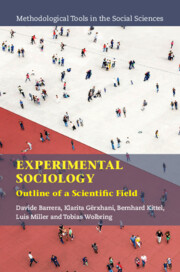Book contents
- Experimental Sociology
- Methodological Tools in the Social Sciences
- Experimental Sociology
- Copyright page
- Contents
- Figures, Tables, and Boxes
- Preface
- 1 Introduction
- Part I The Philosophy and Methodology of Experimentation in Sociology
- 2 The Development of Experimental Sociology
- 3 What Makes Sociological Experiments Different from Other Experiments?
- 4 Experiments and Causality
- 5 Experimental Designs and Typologies
- Part II The Practice of Experimentation in Sociology
- Part III Methodological Challenges of Experimentation in Sociology
- References
- Index
4 - Experiments and Causality
from Part I - The Philosophy and Methodology of Experimentation in Sociology
Published online by Cambridge University Press: 23 November 2024
- Experimental Sociology
- Methodological Tools in the Social Sciences
- Experimental Sociology
- Copyright page
- Contents
- Figures, Tables, and Boxes
- Preface
- 1 Introduction
- Part I The Philosophy and Methodology of Experimentation in Sociology
- 2 The Development of Experimental Sociology
- 3 What Makes Sociological Experiments Different from Other Experiments?
- 4 Experiments and Causality
- 5 Experimental Designs and Typologies
- Part II The Practice of Experimentation in Sociology
- Part III Methodological Challenges of Experimentation in Sociology
- References
- Index
Summary
Sociology is a science concerning itself with the interpretive understanding of social action and thereby with a causal explanation of its course and consequences. Empirically, a key goal is to find relations between variables. This is often done using naturally occurring data, survey data, or in-depth interviews. With such data, the challenge is to establish whether a relation between variables is causal or merely a correlation. One approach is to address the causality issue by applying proper statistical or econometric techniques, which is possible under certain conditions for some research questions. Alternatively, one can generate new data with experimental control in a laboratory or the field. It is precisely through this control via randomization and the manipulation of the causal factors of interest that the experimental method ensures – with a high degree of confidence – tests of causal explanations. In this chapter, the canonical approach to causality in randomized experiments (the Neyman–Rubin causal model) is first introduced. This model formalizes the idea of causality using the "potential outcomes" or "counterfactual" approach. The chapter then discusses the limits of the counterfactual approach and the key role of theory in establishing causal explanations in experimental sociology.
Keywords
- Type
- Chapter
- Information
- Experimental SociologyOutline of a Scientific Field, pp. 40 - 51Publisher: Cambridge University PressPrint publication year: 2024

